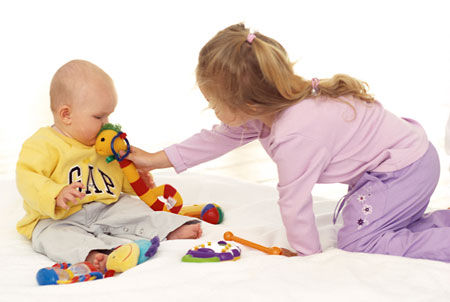Nothing can unsettle a firstborn child like the impending arrival of a new baby. Until this moment he’s had mom and dad all to himself and he expects this way of life to continue forever. No wonder that the thought of a new brother or sister fills him with anxiety.
Look at it from the child’s point of view. You and your partner spend all your time with him when you are at home; he is the only child you spend your money on; he gets lots of clothes and presents; and his aunts, uncles, and grandparents shower him with love. Then, just when everything is ticking along nicely, the adults start talking about a new baby. He may have thoughts like, “Why do mom and dad need another baby? Am 1 not good enough for them?” “What have I done wrong to make them want another child?” or even, “Will the new baby take my room so that I’ll have nowhere to sleep?” We, as adults, know without a shadow of doubt that loving a second baby doesn’t decrease our love for the first. However, your first-born doesn’t know that. He has to learn by experience, and that takes time. In the meantime, feelings of jealousy toward the new baby may dominate.
Tell your child in advance that he’s going to have a new brother or sister. Don’t wait until the last moment when the contractions are coming every couple of minutes. But don’t tell him about the new baby when you are only a few weeks into your pregnancy either. A child’s sense of time is different from that of an adult; he may see no difference between a week and a month, or between one month and six months. He may become bored with the long wait.
Start introducing the idea of the new baby when your tummy is so large that even an inexperienced toddler would notice it, probably around the seventh month or so. Tell your child calmly and openly. Conduct the conversation at a level suitable for his age and understanding, and avoid giving too many bits of information at one time. Whatever you do, don’t beat the topic to death.
Your child may react with indifference, or he may seem very interested and want to talk about it further. Or he may simply burst into tears. Be prepared to let your child ask you questions, either at the time you tell him or later, and always reply honestly. Let your child express any anxieties he has, without reacting in a way that makes him wish he hadn’t opened his mouth.
When your first-born sees his new brother or sister for the first time, make sure the baby has a present for him (one that you had ready beforehand) and let your first-born have one to give the new arrival. Of course, this exchange of gifts is artificial, but it can help forge an emotional connection between the two children right from the start.
Expect your first-born to feel jealous. He may show signs of this by becoming aggressive toward you, or by being clingy and not letting you out of his sight, or even by regressing and becoming babyish himself. These reactions are natural. Try not to get angry with your child when he behaves this way, no matter how irritating and attention-seeking he is. Any anger and rejection at your child’s behavior will only confirm his worst fears that you love him less than the new baby.
The following strategies will help ease your first-born’s jealousy:
- Get your child involved in the practicalities of baby care. Let him fetch diapers from the cupboard, or pass the baby powder. Even a toddler is able to do something to help.
- Encourage visitors to spend a few moments with your first-born before they go in to see the baby. The steady stream of visitors to your house has come for one purpose only, namely, to set eyes on the new arrival. Discreetly ask them to give your older child some attention as well.
- Let your child help you show the baby to visitors. The baby is a new member of his family too. He can take the adults into the baby’s room and can explain to them all about his little brother or sister.
- Acknowledge your child’s maturity. If your child is upset by the presence of the new arrival, an extra ten minutes of television before bedtime because he is “a big brother now” will provide some recognition of the fact. Any positive change that acknowledges he is older than the baby will help. Let your child spend more time with adults instead of being sent out to play; read a special book together; allow your child to choose what cookie he eats with his juice.
- Be honest with your child. Nothing is wrong in admitting to your first-born child that caring for a young baby makes you tired, and that at times you get exhausted from all the chores you have to do (though don’t overdo it in case he thinks you dislike the baby).

